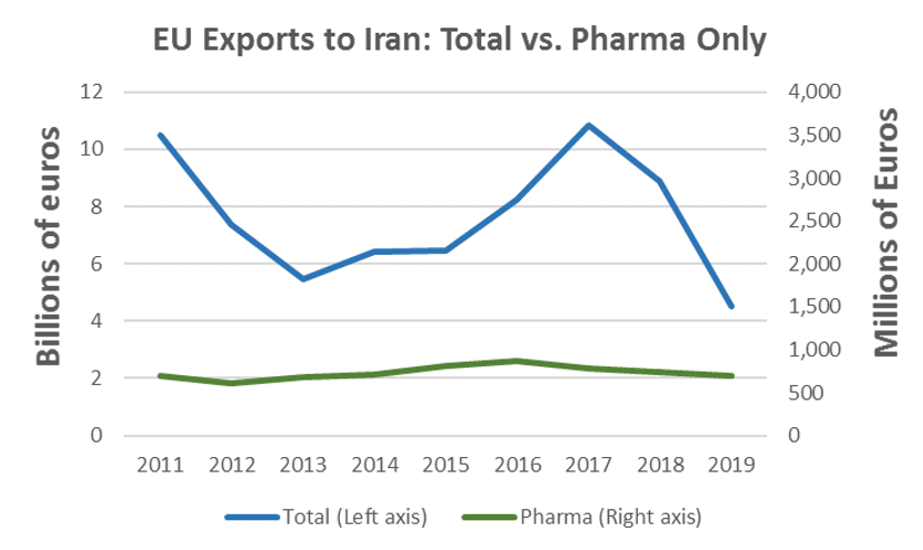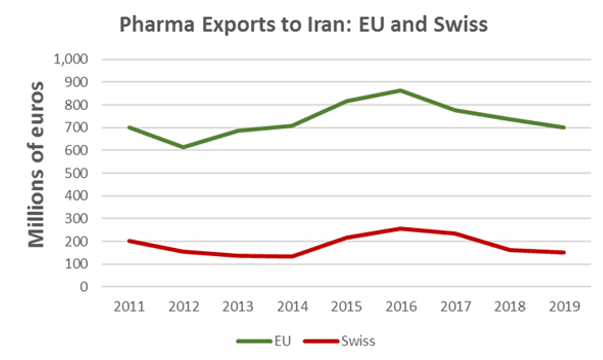March 10, 2020 | Policy Brief
Trade Data Shows Sanctions Have Little Impact on Iranian Pharma Imports
March 10, 2020 | Policy Brief
Trade Data Shows Sanctions Have Little Impact on Iranian Pharma Imports
During the first full year after the re-imposition of U.S. sanctions, total EU exports to Iran fell by nearly half, while pharmaceutical exports fell by just over 5 percent. Despite assertions that U.S. sanctions have worsened the coronavirus epidemic in Iran, the data do not indicate that Iran has had difficulty maintaining its imports of pharmaceuticals.
According to the official Eurostat database, total EU exports to Iran fell from €8.9 billion in 2018 to €4.5 billion in 2019, while pharmaceutical exports fell from €738 million to €698 million. Most U.S. sanctions went into effect in November 2018, six months after the U.S. withdrawal from the Iran nuclear deal. Thus, a year-on-year comparison of 2018 to 2019 provides a good, though imperfect, approximation of the sanctions’ impact.
As required by law, U.S. sanctions on Iran have never prohibited trade in food, medicine, or other humanitarian goods. While Iranian Foreign Minister Javad Zarif often insists that sanctions prevent Iran from importing medicine, the regime’s own health officials have consistently denied that this is the case. Some have directly blamed corruption and mismanagement for the country’s shortages.
Western media frequently report as fact that sanctions are responsible for shortages. While acknowledging that U.S. law allows humanitarian trade, media reports allege that Western firms’ fear of sanctions create a “chilling effect” that creates an aversion even to legitimate transactions. Despite anecdotal evidence of such concerns, official data provide a very different picture.
The European Union is Iran’s top source of pharmaceuticals, followed by Switzerland. From 2000 through 2011, total EU exports to Iran rapidly increased, rising from €5.4 billion to €10.5 billion. Total Swiss exports to Iran rose also during that interval, from 393 million francs to 675 million, according to the country’s official Swiss Impex database. (The value of the franc has ranged from $0.90 to $1.10 over the past 10 years.)
The growth in pharmaceutical exports to Iran was even more rapid: EU pharma exports increased more than five-fold to €698 million in 2011, while Swiss pharma exports roughly tripled to 200 million francs.
Trade plummeted after the revelation of Tehran’s illicit nuclear program led to multilateral sanctions that remained in place until the Iran nuclear deal went into effect at the beginning of 2016. EU exports then returned to pre-sanctions levels, reaching €10.8 billion in 2017.
While total Swiss exports were slow to recover, pharmaceutical exports to Iran reached a new peak of 254 million francs in 2016. EU pharmaceutical exports also achieved a new benchmark that year of €864 million. For reasons that remain unclear, Iranian purchases of EU and Swiss pharmaceuticals fell sharply in 2017 and 2018 prior to the re-imposition of U.S. sanctions. EU exports to Iran fell about 15 percent over two years to €738 million, while Swiss exports fell 35 percent to €164 million.
Against this backdrop, the single-digit decline in Iranian pharmaceutical purchases in 2019 may just be noise in the data with no relationship to the return of sanctions. Nonetheless, the U.S. Treasury Department has partnered with the Swiss government to open a special channel for humanitarian trade with Iran, which may help avert a potential decline in legitimate commerce. At the end of January, the U.S. and Swiss governments announced the completion of the first transactions through the special channel, consisting of €2.3 million of cancer and transplant drugs.
Washington should build on this successful example of how to exert maximum pressure on the Islamist dictatorship in Iran while demonstrating its solidarity with the Iranian people, who are now suffering an epidemic brought on the insecurity and deceit of their own rulers.
David Adesnik is director of research and a senior fellow at the Foundation for Defense of Democracies (FDD), where Saeed Ghasseminejad is senior Iran and financial economics advisor. They both contribute to FDD’s Center on Economic and Financial Power (CEFP). For more analysis from David, Saeed, and CEFP, please subscribe HERE. Follow David and Saeed on Twitter @adesnik and @SGhasseminejad. Follow FDD on Twitter @FDD and @FDD_CEFP. FDD is a Washington, DC-based, nonpartisan research institute focusing on national security and foreign policy.

